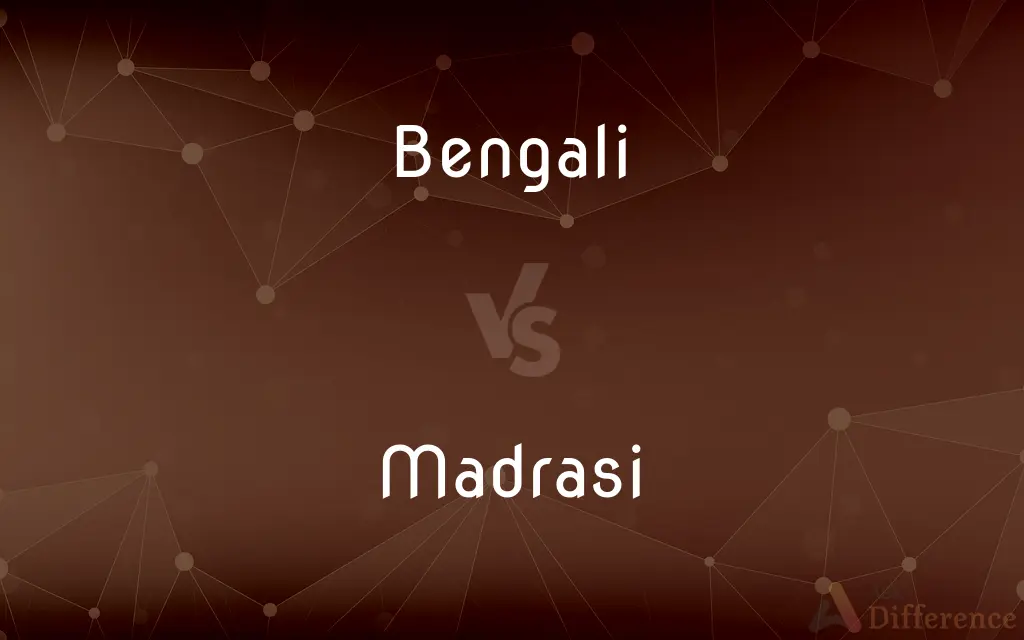Bengali vs. Madrasi — What's the Difference?
By Maham Liaqat & Fiza Rafique — Updated on April 2, 2024
Bengali refers to people from Bengal region, emphasizing cultural and linguistic identity. Madrasi is an outdated term for South Indians, often seen as pejorative.

Difference Between Bengali and Madrasi
Table of Contents
ADVERTISEMENT
Key Differences
Bengali pertains to the people, language, and culture originating from the Bengal region, which encompasses parts of present-day Bangladesh and the Indian state of West Bengal. On the other hand, Madrasi is a term historically used to refer to individuals from the Madras region in India, now known as Chennai and its surrounding areas in the state of Tamil Nadu, but has often been inaccurately and dismissively applied to all South Indians.
The Bengali language, an Indo-Aryan language, is the primary language spoken by the Bengali people and serves as a significant aspect of their cultural identity. In contrast, the term Madrasi does not relate to a specific language; South India is linguistically diverse, with major languages including Tamil, Telugu, Kannada, and Malayalam, none of which is called Madrasi.
Culturally, Bengalis are known for their rich heritage in literature, art, music, and cuisine, with the Durga Puja festival being one of their most significant and widely celebrated events. Conversely, the cultural practices associated with the term Madrasi reflect the broad and rich traditions of South India, including various classical dance forms, music, and festivals, but using the term Madrasi to describe these diminishes the distinct cultures of the region's diverse communities.
In terms of cuisine, Bengali food is characterized by its use of fish, rice, and lentils, with mustard oil and panch phoron (five-spice blend) being distinctive flavor components. The cuisine often referred to by the term Madrasi, more accurately South Indian cuisine, includes a wide variety of vegetarian and non-vegetarian dishes, known for its use of rice, lentils, coconut, and a range of spices, featuring dishes like dosa, idli, and sambhar.
The term Madrasi has been criticized for its generalizing and pejorative implications, failing to respect the cultural and linguistic diversity of South India. In contrast, Bengali is a term of pride and identity, celebrating the unique culture and language of the Bengal region. The movement away from using broad, inaccurate terms reflects a growing awareness and respect for the rich tapestry of India's regional identities.
ADVERTISEMENT
Comparison Chart
Definition
Pertains to Bengal region, language, and culture.
Historically referred to people from Madras/Chennai; often misused for all South Indians.
Language
Bengali (Indo-Aryan language).
Associated with Tamil but inaccurately used for all South Indian languages.
Cultural Identity
Rich in literature, art, music, and cuisine.
Term diminishes the diverse cultural identities of South India.
Cuisine
Known for fish, rice, and mustard oil flavors.
Incorrectly associated with South Indian cuisine, which is diverse.
Perception
Term of pride and identity.
Seen as pejorative and generalizing.
Compare with Definitions
Bengali
Reflecting the historical and cultural significance of the Bengal region.
Bengali artisans are celebrated for their craftsmanship in textile production.
Madrasi
A term previously used to refer to people from Madras (now Chennai).
The term Madrasi is now considered outdated and inappropriate.
Bengali
A linguistic and cultural group from the Bengal region.
The Bengali community celebrated Durga Puja with great fervor.
Madrasi
Associated with South Indian cuisine in general usage, but inaccurately.
South Indian cuisine, often mislabeled as Madrasi, includes a wide variety of dishes.
Bengali
Pertaining to Bengal's rich artistic and musical heritage.
Bengali folk music has a unique charm and appeal.
Madrasi
Incorrectly applied to all South Indians, disregarding linguistic and cultural diversity.
Calling all South Indians Madrasi overlooks the rich diversity of the region.
Bengali
Associated with Bengal's distinct culinary traditions.
Traditional Bengali cuisine includes a variety of fish dishes.
Madrasi
Considered pejorative due to its generalizing nature.
The use of Madrasi is discouraged due to its pejorative implications.
Bengali
Relating to the Bengali language, spoken in Bangladesh and parts of India.
Bengali literature is renowned for its depth and poetic beauty.
Madrasi
Reflects a lack of understanding of India's regional complexities.
The misuse of Madrasi shows a need for greater awareness of regional identities.
Bengali
Of or relating to Bengal or its people, language, or culture.
Madrasi
Madrasi also spelled as Madrassi, is a term used as a demonym and a regional slur for people from southern India. In earlier usage it was a demonym to refer to the people of Madras Presidency; however this use of the term is now outdated.
Bengali
A native or inhabitant of Bengal.
Bengali
A person of Bengali ancestry.
Bengali
The modern Indic language of Bangladesh and West Bengal, a state of eastern India.
Bengali
Of or pertaining to the Bengali language; as, Bengali poetry.
Bengali
Of, pertaining to, or characteristic of Bangladesh (formerly Bengal) or its inhabitants; as, Bengali hills.
Bengali
(Hinduism) a member of a people living in Bangladesh and West Bengal (mainly Hindus)
Bengali
An ethnic group speaking Bengali and living in Bangladesh and eastern India
Bengali
A Magadhan language spoken by the Bengali people; the official language of Bangladesh and Bengal
Bengali
Of or relating to or characteristic of Bengal or its people;
Bengali hills
Common Curiosities
Can the term Madrasi refer to South Indian cuisine?
While sometimes used that way, it inaccurately represents the rich diversity of South Indian cuisine.
Are Bengali and Madrasi languages?
Bengali is a language, whereas Madrasi is not; it inaccurately refers to South Indian languages.
Why is the term Madrasi considered outdated?
It's considered outdated and pejorative because it inaccurately generalizes and diminishes the diverse cultures of South India.
What defines a Bengali?
A Bengali is someone from the Bengal region, known for their language, culture, and traditions.
What is distinctive about Bengali cuisine?
Bengali cuisine is known for its emphasis on fish, rice, and mustard oil.
Can cuisine be a significant cultural identifier?
Yes, cuisine reflects the agricultural practices, historical influences, and cultural preferences of a region.
Is the term Madrasi acceptable to use?
No, it's considered disrespectful due to its generalizing and pejorative nature.
What is the impact of misusing the term Madrasi?
Misuse promotes stereotypes and overlooks the cultural and linguistic diversity of South Indians.
Why is it important to recognize the diversity within Indian regions?
Recognizing diversity respects the unique cultural, linguistic, and historical identities of India’s regions.
What cultural practices are associated with Bengalis?
Cultural practices include Durga Puja, literature, music, and arts.
How does the Bengali language contribute to its cultural identity?
The Bengali language is central to the region’s literary and artistic expressions.
How does Bengal's history influence its culture?
Bengal's rich history of trade, colonialism, and intellectual movements has deeply influenced its culture.
What makes Bengali music and art distinctive?
It's known for its poetic expression, classical and folk influences.
How has globalization affected regional identities like Bengali?
Globalization has both challenged and spread regional identities, making cultural preservation and global awareness more crucial.
Share Your Discovery

Previous Comparison
Elope vs. Marry
Next Comparison
Puri vs. ChapatiAuthor Spotlight
Written by
Maham LiaqatCo-written by
Fiza RafiqueFiza Rafique is a skilled content writer at AskDifference.com, where she meticulously refines and enhances written pieces. Drawing from her vast editorial expertise, Fiza ensures clarity, accuracy, and precision in every article. Passionate about language, she continually seeks to elevate the quality of content for readers worldwide.















































